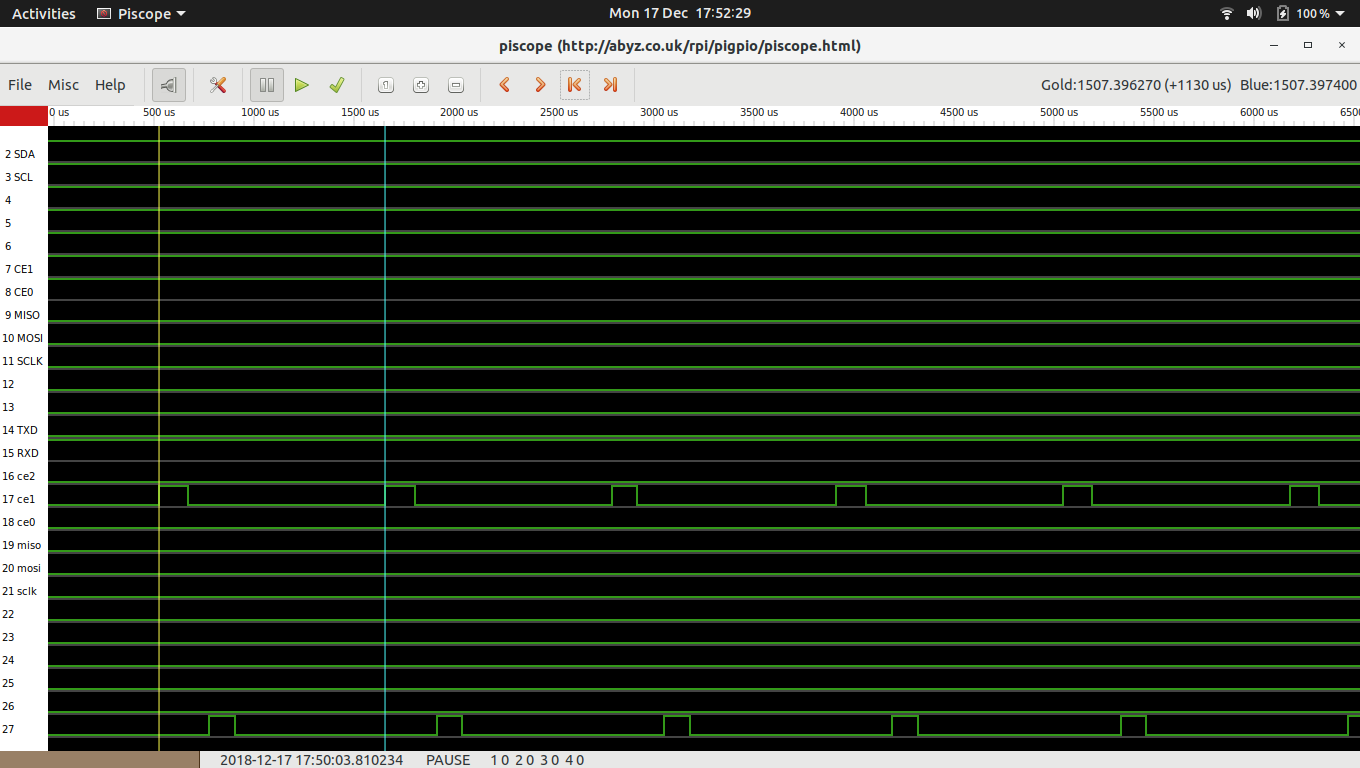I am developing a robot with raspberry pi model b along with three servo motors. I have two functions which are defined for obtain robot behaviours. In the first function my servos are working well. After completing first function, second function start. But their is problem. My servos are not working at all in the second function. I have attached my code below. I tried for days about this issue. But I couldn't find it out.
import RPi.GPIO as GPIO
import time
import threading
import datetime
GPIO.setmode(GPIO.BOARD)
GPIO.setwarnings(False)
#set up GPIO pin outputs for servo motors
GPIO.setup(11, GPIO.OUT)
GPIO.setup(13, GPIO.OUT)
GPIO.setup(15, GPIO.OUT)
#set up pwm for the pins
pwm1 = GPIO.PWM(11, 50)
pwm2 = GPIO.PWM(13, 50)
pwm3 = GPIO.PWM(15, 50)
#set up controlling boolean values
boolean_1 = False
boolean_2= False
boolean_3= False
boolean_4= False
def function3():
global boolean_1 , pwm3
pwm3.start(0)
while boolean_1:
for i in range(70, 110):
position = 1./18.*(i)+2
pwm3.ChangeDutyCycle(position)
time.sleep(0.015)
for i in range(110, 70, -1):
position = 1./18.*(i)+2
pwm3.ChangeDutyCycle(position)
time.sleep(0.015)
for i in range(70, 90):
position = 1./18.*(i)+2
pwm3.ChangeDutyCycle(position)
time.sleep(0.001)
pwm3.stop()
def function2():
global boolean_2, pwm1, pwm2
pwm1.start(0)
pwm2.start(0)
while boolean_2:
for i in range(60, 120):
position_1 = 1./18.*(i)+2
position_2 = 1./18.*(180-i)+2
pwm1.ChangeDutyCycle(position_1 )
pwm2.ChangeDutyCycle(position_2 )
time.sleep(0.005)
for i in range(120, 60, -1):
position_1 = 1./18.*(i)+2
position_2 = 1./18.*(180-i)+2
pwm1.ChangeDutyCycle(position_1 )
pwm2.ChangeDutyCycle(position_2 )
time.sleep(0.05)
pwm1.stop()
pwm2.stop()
def function1():
global boolean_1 , boolean_3 , boolean_4
t_start = datetime.datetime.now()
start_time = (round(t_start.microsecond/1000000) + t_start.second + t_start.minute*60 + t_start.hour*3600)
boolean_1 = True
t1 = threading.Thread(target = function3, args=())
t1.start()
t2 = threading.Thread(target = function5, args=())
t3 = threading.Thread(target = function4, args=())
while True:
t_cur = datetime.datetime.now()
current_time = (round(t_cur.microsecond/1000000) + t_cur.second + t_cur.minute*60 + t_cur.hour*3600)
if((current_time - start_time) < 10):
if not boolean_3 :
boolean_3 = True
t2.start()
elif((current_time - start_time) >= 10 and (current_time - start_time) < 20):
if boolean_3 :
boolean_3 = False
t2.join()
if not boolean_4 :
boolean_4 = True
t3.start()
elif((current_time - start_time) >= 20):
boolean_4 = False
t3.join()
boolean_1 = False
t1.join()
break
def function4():
global boolean_4
pwm2.start(0)
while boolean_4:
for i in range(60, 120):
position = 1./18.*(180-i)+2
pwm2.ChangeDutyCycle(position)
time.sleep(0.001)
for i in range(120, 60, -1):
position = 1./18.*(180-i)+2
pwm2.ChangeDutyCycle(position)
time.sleep(0.01)
pwm2.stop()
def function5():
global boolean_3
pwm1.start(0)
while boolean_3:
for i in range(60, 120):
position = 1./18.*(i)+2
pwm1.ChangeDutyCycle(position)
time.sleep(0.001)
for i in range(120, 60, -1):
position = 1./18.*(i)+2
pwm1.ChangeDutyCycle(position)
time.sleep(0.01)
pwm1.stop()
def function_controll():
global boolean_2
t5 = threading.Thread(target = function1, args=())
t5.start()
t5.join()
boolean_2 = True
function2()
boolean_2= False
if __name__ == "__main__":
t1 = threading.Thread(target = function_controll, args=())
t1.start()
t1.join()
GPIO.cleanup()
Here, function3, function4 and function5 are functions use in function1. This might be a very basic thing with servos. But since I new to this stuff i need a help. Any help would be grateful.
I have updated..
Thank you very much !

